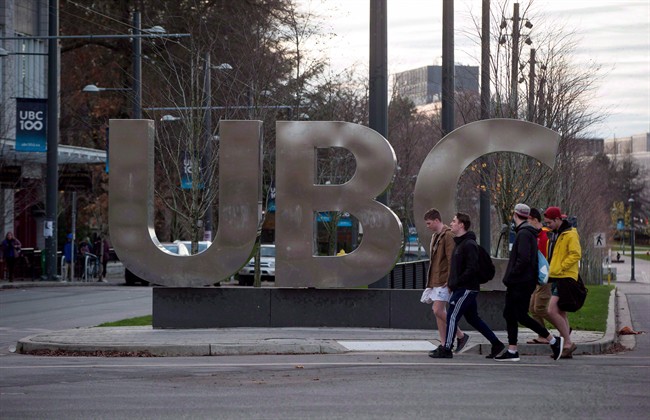Author Steven Galloway was awarded $167,000 by an arbitrator after he was first suspended from his position as head of UBC’s creative writing program over “serious allegations” and later dismissed.

Arbitrator John B. Hall found on Friday that “certain communications by the university” contravened Galloway’s privacy rights and “caused harm to his reputation.”
WATCH: From 2015 — UBC creative writing program head suspended
Hall considered two grievances — one concerned Galloway’s temporary suspension from the creative writing program amid an investigation into what it called “serious allegations.”
That description came from a memo issued to faculty, students and staff in the program in November 2015.
That grievance alleged UBC’s actions had violated Galloway’s privacy rights, and caused him “irreparable reputation damage and financial loss.”
READ MORE: UBC fires author Steven Galloway after investigation
The second grievance concerned Galloway’s dismissal as a tenured associate professor effective June 21, 2016.
UBC’s Faculty Association challenged Galloway’s termination and alleged there were “substantial procedural violations” by UBC’s administration.

It was also alleged that UBC’s communications around his termination were “misleading and had caused both serious reputational damage and ongoing personal suffering.”

Get daily National news
The Faculty Association later withdrew a claim on Galloway’s behalf for his reinstatement — it also withdrew claims for compensation for lot income and benefits.
Therefore, the issue of Galloway’s dismissal was no longer considered as part of the arbitration process.
UBC accepted the arbitrator’s decision in a statement issued by Philip Steenkamp, UBC’s vide-president of external relations.
Galloway’s firing
The university fired Galloway, the award-winning author of The Cellist of Sarajevo, in June 2016 without severance, citing “a record of misconduct that resulted in an irreparable breach of the trust placed in faculty members.”
- Board of Metro Vancouver’s CAO tight-lipped about status, cost of ‘leak’ investigation
- Watch the 60th annual Variety Show of Hearts Telethon
- ‘May be a thawing’ between Canada and U.S., B.C. premier says after tariff court ruling
- Canada warns First Nations people to carry passport when crossing U.S. border
The firing followed a months-long investigation into his conduct by a retired judge, whose report has never been made public.
Galloway has confirmed he was accused of sexual assault, but has said the only complaint substantiated by the report was that he had a two-year affair with a student. The student said her complaint was not about a consensual affair, but about sexual harassment and sexual assault.
The Canadian Press does not name sexual assault complainants unless they choose to be identified.
Galloway could not immediately be reached for comment and a lawyer who has represented him in the past did not immediately respond.
The arbitrator wrote that all other elements of the case, other than the decision released Friday, will remain confidential. As a result, the faculty association said it cannot discuss its decision to drop its claim for Galloway’s reinstatement, lost wages and benefits.
The association released a statement that said its fundamental role is to ensure that all members receive due process and the protection of their rights in any proceedings conducted by the university.
“The faculty association will continue to work diligently to protect the rights and interests of its members at UBC,” the statement said.
The university is bound by the province’s Freedom of Information and Protection of Privacy Act, which prevents it from disclosing information about an employee unless the individual waives their rights or if it’s necessary for health and safety reasons.
The secrecy around the case has sparked questions about how the university handled the situation.
In November 2016, dozens of prominent Canadian writers, including Margaret Atwood and Joseph Boyden, signed an open letter calling for an external investigation of how the school dealt with Galloway’s case.
They were later criticized because of the potential silencing effect the letter could have on any woman who considered reporting allegations of misconduct at universities and a number of writers, including Yann Martel, removed their names.
In March, Atwood released a joint statement with fellow novelist Susan Swan apologizing for any perception of harm or silencing effects the letter may have had.
- With files from Laura Kane at The Canadian Press







Comments
Want to discuss? Please read our Commenting Policy first.